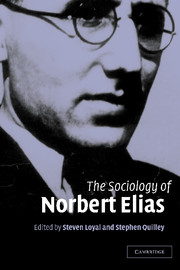Book contents
- Frontmatter
- Contents
- List of contributors
- Acknowledgements
- 1 Towards a ‘central theory’: the scope and relevance of the sociology of Norbert Elias
- Part I Sociology as a human science: Norbert Elias and the sociology of knowledge
- Part II Processes of stratification: figurations of race, class and gender
- Part III The formation of individuals and states
- 9 Not so exceptional? State-formation processes in America
- 10 Armed peace: on the pacifying condition for the ‘cooperative of states’
- 11 Changing regimes of manners and emotions: from disciplining to informalizing
- 12 Elias and modern penal development
- 13 Elias, Freud and Goffman: shame as the master emotion
- Part IV Religion and civilizing processes: Weber and Elias compared
- Index
- References
11 - Changing regimes of manners and emotions: from disciplining to informalizing
Published online by Cambridge University Press: 22 September 2009
- Frontmatter
- Contents
- List of contributors
- Acknowledgements
- 1 Towards a ‘central theory’: the scope and relevance of the sociology of Norbert Elias
- Part I Sociology as a human science: Norbert Elias and the sociology of knowledge
- Part II Processes of stratification: figurations of race, class and gender
- Part III The formation of individuals and states
- 9 Not so exceptional? State-formation processes in America
- 10 Armed peace: on the pacifying condition for the ‘cooperative of states’
- 11 Changing regimes of manners and emotions: from disciplining to informalizing
- 12 Elias and modern penal development
- 13 Elias, Freud and Goffman: shame as the master emotion
- Part IV Religion and civilizing processes: Weber and Elias compared
- Index
- References
Summary
Introduction
In this chapter, I outline changes in the regimes of manners and emotions in the West between the fifteenth and the twenty-first century. I will use the material and perspective developed by Norbert Elias in The Civilizing Process, and extend Elias's own investigation through to the end of the twentieth century. By studying manners books, Elias uncovered evidence of long-term changes in social codes as well as in people's psychic makeup. According to his theory, the dynamic momentum of these directional processes derives from ‘the increasing division of functions under the pressure of competition’ (2000: 433), tending to integrate increasing numbers of people in expanding and increasingly dense networks of interdependency. He showed these changes in power and dependency relationships to be connected with changes in sources of power and identity, in competition for status and a meaningful life, and also with changes in how the manners people of different class, sex or age showed a demand for respect or fear of the loss of. With Elias, I understand changes in the code of manners and feeling to illuminate changes in relationships between individuals and groups (social classes, sexes and generations – sociogenesis) as well as psychic processes within people, i.e. in how individuals manage their emotions and ‘relate to themselves’ (psychogenesis).
The history of Western manners and emotion management shows that the more extreme expressions of social and psychic distance between people of different social class, age and gender have declined and vanished.
- Type
- Chapter
- Information
- The Sociology of Norbert Elias , pp. 193 - 211Publisher: Cambridge University PressPrint publication year: 2004
References
- 17
- Cited by



